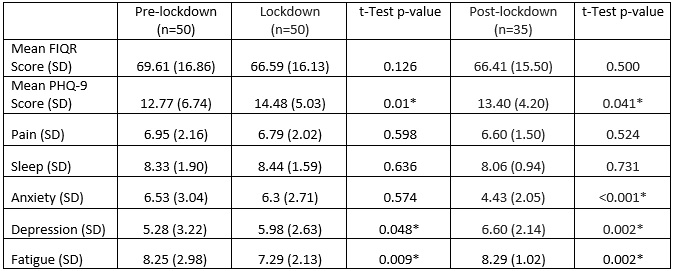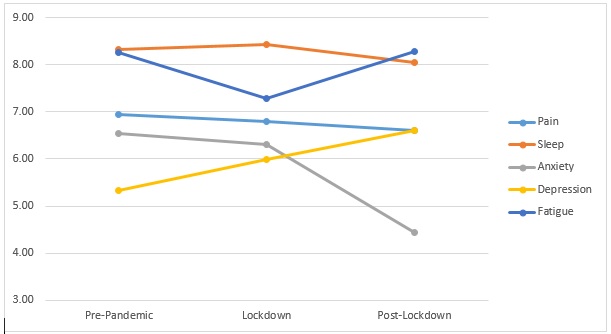Session Information
Date: Saturday, November 6, 2021
Title: Fibromyalgia & Other Clinical Pain Syndromes Poster (0118–0127)
Session Type: Poster Session A
Session Time: 8:30AM-10:30AM
Background/Purpose: To gauge the impact of severe COVID-19 related lockdown restrictions on the mental and physical wellbeing of Australian fibromyalgia patients and their recovery following the conclusion of the lockdown.
Methods: Telephone or online surveys were conducted with sequential patients from a single Australian tertiary centre specialist fibromyalgia clinic during an enforced 100-day stage 4 lockdown in Melbourne in October 2020. Patients were invited to participate if they had been seen in the 12 months prior to lockdown and had recorded illness impact data from that visit. The patients were reassessed 6 months following the end of the lockdown. There was a 73% response rate. Demographic and clinical information was collected. The Fibromyalgia Impact Questionnaire (Revised Version) (FIQR) was used to assess current fibromyalgia illness impact. The Patient Health Questionnaire 9 (PHQ-9) was used to assess depression symptoms.
Results: Sixty-nine patients were invited to participate, 50 responses were received during the lockdown and 35 responded following the conclusion of the lockdown. No subjects had been diagnosed with COVID infection at any time. Most patients reported increased isolation, decreased exercise, worse sleep and increased use of fibromyalgia-related medications. Twenty-five (50%) of patients had a PHQ-9 score ≥ 15, with 20 patients (40%) reporting moderately-severe and 5 patients (10%) reporting severe depression with an overall mean PHQ9 score of 14.48, this is significantly different to previously collected data from the same cohort where a mean PHQ9 of 12.77 was found (p=0.01). No significant difference was found between pre-lockdown and during lockdown FIQR total score. There was a significant worsening in depression scores and a significant improvement in fatigue subdomain scores. Additionally, there were trends for worse pain, and sleep (table 1).
Six months after the conclusion of the lockdown, surveyed patients self-reported depression had continued to worsen. This seems to contrast with the PHQ-9 scores which show an overall improvement in depression severity compared to the lockdown, resulting in scores not significantly worse than before the lockdown began (Figure 1).
The percentage of patients with mod-severe depression had improved to twelve (34%) patients but this remains higher than previously published data (25%). The observed improvement in fatigue was not sustained with scores returning to pre-pandemic levels. There was a significant improvement in anxiety following the end of the lockdown.
Conclusion: Severe COVID related lockdown restrictions in Melbourne in 2020 resulted in significantly worse reported features of depression and significantly improved fatigue. Other clinical aspects of fibromyalgia were not found to be significantly different from previously reported levels. These changes, other than a continued sense of depression, were not sustained following the conclusion of the lockdown. Whilst the overall mean PHQ-9 score did improve, this remained non-significantly higher than prior to the pandemic. The improvement in fatigue may relate to increased opportunity to rest through the lockdown.
To cite this abstract in AMA style:
Worcester B, Guymer E, Littlejohn G. Worsened Depression but Improved Fatigue Were the Main Impacts of Severe Lockdown in Non- COVID Infected Australian Fibromyalgia Patients [abstract]. Arthritis Rheumatol. 2021; 73 (suppl 9). https://acrabstracts.org/abstract/worsened-depression-but-improved-fatigue-were-the-main-impacts-of-severe-lockdown-in-non-covid-infected-australian-fibromyalgia-patients/. Accessed .« Back to ACR Convergence 2021
ACR Meeting Abstracts - https://acrabstracts.org/abstract/worsened-depression-but-improved-fatigue-were-the-main-impacts-of-severe-lockdown-in-non-covid-infected-australian-fibromyalgia-patients/


